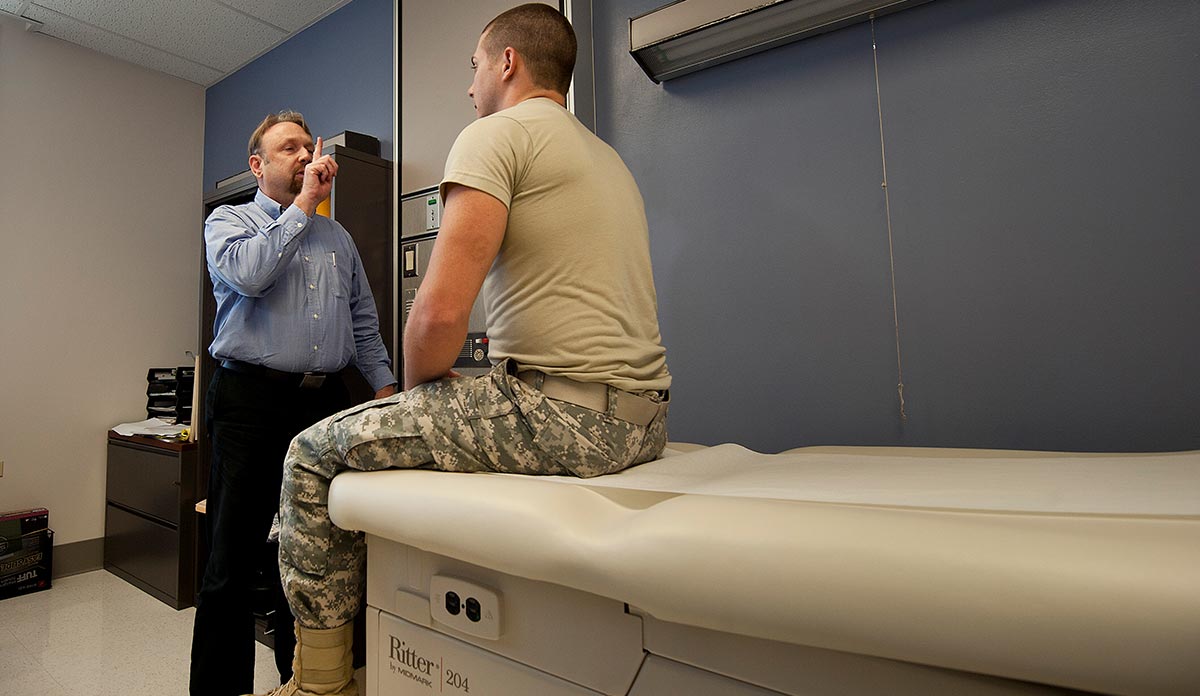More than 2.7 million U.S. service members have served in support of the war efforts in Iraq, Afghanistan, and their surrounding regions. Since 2000, more than 375,000 service members have experienced a traumatic brain injury (TBI), which the Departments of Defense and Veterans Affairs (VA) define as a traumatically-induced structural injury and/or physiological disruption of brain function as a result of an external force. The clinical signs that start or worsen immediately after the injury include at least one of the following: loss of consciousness, memory loss for events immediately before or after the injury, feeling dazed/confused/disoriented, and neurological deficits like changes in vision or loss of balance. The majority of TBIs are classified as mild TBI, also known as concussion, and people usually make a full recovery. However, some continue to have symptoms months to years after the injury.
Many veterans with TBI history also have co-occurring physical and psychological health conditions. Research that examined diagnoses of more than 600,000 post-9/11 veterans found that among the 9.6% with TBI, 62.5% also had post-traumatic stress disorder (PTSD) and pain (such as headache, backache). These conditions may interfere with an individual’s emotional, social, and occupational functioning.
Employment specialists help veterans find jobs that match their interests and skills, and can go to the workplace to help veterans develop strategies to do their jobs well.
Part of veteran readjustment to civilian life includes decisions to continue education or to enter the workforce. However, this can be difficult for veterans with TBI and other health conditions. In a study of more than 11,000 veterans who were evaluated for TBI in the VA, approximately two-thirds were employed or students. But, 20% were unemployed and looking for work, and 15% were unemployed and not looking for work. Unemployment was associated with TBI severity, psychological conditions, and severity of health symptoms.
Recognizing that work contributes to a sense of purpose, social interaction, and financial stability, the VA offers a range of vocational rehabilitation services. These programs include less intensive programs like vocational assistance for those who need guidance on resume development or interview skills and transitional work experience that prepares veterans for competitive employment. Those in need of more intense assistance in a competitive work setting can request supported employment. A key aspect of supported employment is an employment specialist working closely with the treatment team to develop an individualized plan that addresses medical, psychological, vocational, and other needs to maximize success. Employment specialists help veterans find jobs that match their interests and skills, and can go to the workplace to help veterans develop strategies to do their jobs well. Supported employment in the VA is primarily targeted to veterans with severe mental illness, such as schizophrenia or bipolar disorder. However, within the past decade, it has been offered on a limited basis to veterans with spinal cord injury, PTSD, and TBI.
The majority of post-9/11 veterans with TBI and co-occurring conditions are in their prime working years. Increasing resources for and access to vocational rehabilitation programs can facilitate employment success. These services can help veterans achieve their vocational potential, and may also have a social return on investment that will pay dividends for years to come.
Featured image:U.S. Air Force Photo by Staff Sgt. Christopher Hubenthal, Army Medicine, TBI care, used under CC BY 2.0.













